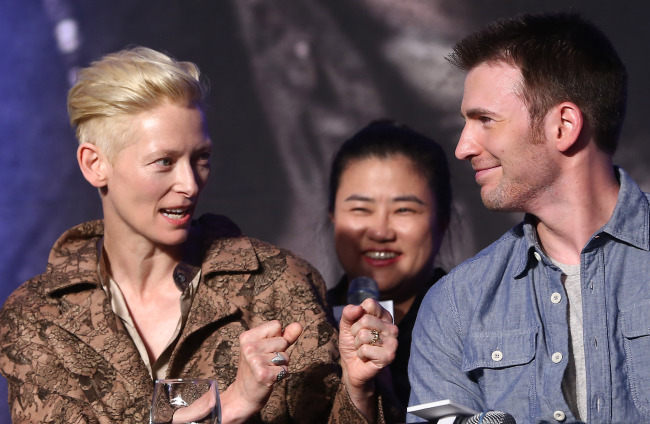What was it like to work with Korean director Bong Joon-ho in making a dystopian sci-fi thriller?
According to famed British actress Tilda Swinton, it was like “being in a kindergarten.”
“What made me decide to be in a Bong Joon-ho film? Bong Joon-ho,” the actress said in a press conference promoting their latest collaboration, “Snowpiercer,” in Seoul, Monday.
“Not only his work, but really, the person. We met maybe two years ago and we became friends instantly. And we wanted to play together. I can’t say anything more complicated than that. We wanted to play together like a pair of children and it was like a kindergarten for us.”
 |
Tilda Swinton (left) and Chris Evans look at each other during a press conference to promote their sci-fi thriller “Snowpiercer” in Seoul on Monday. ( Yonhap News) |
This is Swinton’s (“I Am Love,” “The Chronicles of Narnia,” “We Need to Talk about Kevin”) first time working with Bong ― who jokingly called her an “elf” during the press conference ― and her respect for the director was obvious.
“He knows exactly what he wants,” the 52-year-old actress said when asked about Bong’s directing style.
“But what’s really surprising is that (Bong is) someone who knows so clearly what he wants and yet in the heart of the working process, he remains free. So he has everything planned, but there is still some possibility of free range for the actors. And that I think is really original. And that’s why his films have the human heart in middle of all the complex things in this film; the action sequences, this very precise mise-en-scene, the credible cinematic frame. There is always this possibility in the heart of it.”
Director Bong’s (“Mother,” “The Host”) latest work takes place in a post-apocalyptic world after a failed attempt to halt global warming. The manmade failure precipitates another Ice Age that kills every living thing on the planet, except those who live on the Snowpiercer, a train powered by a perpetual motion engine.
Each of the train’s cabins is labeled by social class. The farther away from the “eternal” and “sacred” engine ― which is located at the very front of the train ― the more dire the poverty and the more harrowing the living conditions. The plot of the film develops as the destitute inhabitants of the last railcar organize a revolution for a dignified life.
In the film, Swinton plays Mason, the dictatorial prime minister of the ruling front section of the train. The character is abusive and controlling in the beginning, and gradually becomes disturbingly obsequious to the angry working-class revolutionaries. For the role, whose gender is, according to Swinton, ambiguous ― “who is it to say Mason is female? Maybe Mason is an elf,” she said ― the actress put on some funky makeup. In the film, she wears a prosthetic nose, a set of false, crooked teeth and artificially-protruding lips. In fact, creating Mason was one of the most fun parts of their “kindergarten,” it seems.
“When I first met director Bong, which was in Cannes, I had decided I didn’t want to make any more films,” the actress said.
“This is the decision that I make after every single film that I make. And I said to director Bong, well, of course, I’d love to work with you, but I don’t want to make any films. And that one (and only) condition in which I will make another film is that I will have some fun. So we started to play with the idea of what would amuse us about this.
“And honestly, practically, I’ve always had this fantasy of playing a character who has a nose like Mason’s,” she continued. “And I shared this with director Bong, expecting him to may be saying, ‘Well, this would be inappropriate for this character.’ But he said, ‘No, let’s do it, let’s go for it.’ And then I continued with my fantasies. The fantasy about his teeth and the fantasy about his voice. We played like children. It was no more sophisticated than a 6-year-old dressing up as an old lady or a dog. It was unsophisticated and sophisticated as that.”
The actress seemed rather weary of the series of questions asking about her experience working with the film’s international cast and crew.
“It’s very curious for me to hear constantly the references to the nationality of filmmakers,” she said. ‘I am personally a great respecter of the idea of nationality in art. I believe that cinema, in particular, is kind of a free range opportunity for all of us to be human. So in that spirit, this particular crew of people was a family. They were under the leadership of Bong, who is the big child, and it was a family of really inspired and playful individuals. For me, it felt really, really natural. Let’s face it. It felt like I was in Scotland. That’s enough of nationality conversation.”
By Claire Lee (
dyc@heraldcorp.com)







![[Exclusive] Hyundai Mobis eyes closer ties with BYD](http://res.heraldm.com/phpwas/restmb_idxmake.php?idx=644&simg=/content/image/2024/11/25/20241125050044_0.jpg)
